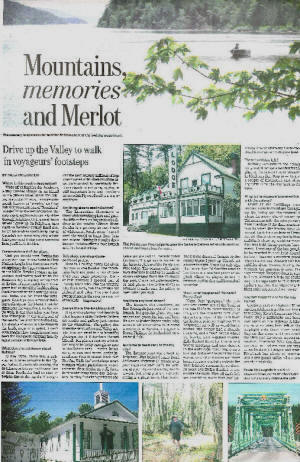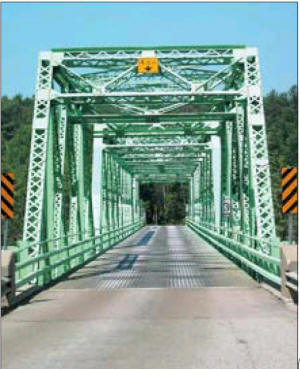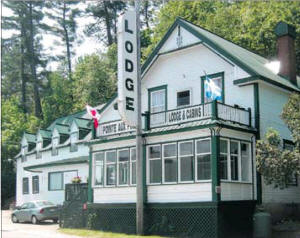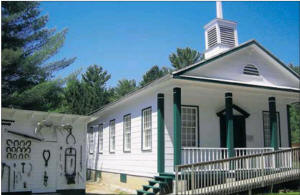|
|

Mountains, memories and Merlot
Drive up the Valley to walk in voyageurs' footsteps
By Paula McLaughlin, Ottawa Citizen August 13, 2011

WHERE IS THIS WEEK'S DESTINATION?
We're off to Rapides-des-Joachims, a tiny Quebec village on an island in
the Ottawa River, about 220 kilometres west of Ottawa. It's more
commonly known as "Swisha," an English mispronunciation of "Joachims."
Isolated from the rest of Quebec, the only way to get there by car is to
drive through Rolph ton, Ont., a small town where I grew up. In
Rolphton, turn right on Renfrew County Road 635. In 2.5 kilometres
you'll cross one of Canada's few remaining single-lane interprovincial
bridges and a minute later you'll be in Swisha.

I'VE NEVER HEARD OF THE PLACE.
Well, you should have. Swisha has a very rich past. It was home to First
Nations long before Europeans started exploring the Upper Ottawa River
in the 1600s. Swisha became an important fur-trading post when the
Hudson's Bay Company set up shop at the foot of some rapids here.
Voyageurs had to shoulder backbreaking loads through what is now the
townsite. Today, you can trace the voyageurs' footsteps on a series of
walking trails across the island. Look for signs near the waterfront. My
favourite walk is one that takes you from Rue Principale to the headpond
of the nearby Des Joachims hydro dam. It's about a 40-minute hike
through the bush, most of it uphill. I can't even imagine how tough it
must have been for voyageurs carrying heav ily laden canoes on this
portage.
WHAT ELSE SHOULD I KNOW ABOUT SWISHA?
By the 1870s, there was a substantial lumber industry in the Upper
Valley. Steamboats making the 65-kilometre trip up the Ottawa River from
Pembroke had to stop in Swisha due to the rapids. Throughout the next
century millions of logs were floated or trucked out of the area.
Surrounded by seemingly limitless stands of red pine, logging is still
important here and the Commonwealth Plywood mill is a major employer.
ANYTHING ELSE TO SEE IN SWISHA?
The Laurentian Mountains - lined with towering pines and granite cliffs
- form an impressive backdrop to the mighty Ottawa River. Swisha is a
gateway to vast tracts of wilderness. People come from all over the
world to hunt deer, bear and moose. Fishing is a major draw too and
Swisha offers a boat launch and free boat docking.
THIS PLACE SOUNDS PICTUREPOSTCARD PRETTY.
Sure is. Looking down the river, the view is spectacular. The mountains
here are home to one of Canada's rare eagle preserves. Earlier this
summer I spotted one of the big birds who, like the tourists who flock
here, fish the Ottawa for pickerel and pike. The one I saw swooped
across the river in a matter of seconds - impressive!

SEEMS LIKE ARTIST-INSPIRING STUFF.
It is, and capturing that beauty is what happens at the Gallerie Gallera
art studio and gallery just opposite the waterfront. The gallery
displays the work of several Valley artists. You can revel in the
beautiful photography of Rolphton's Robert Mirault. His photos capture
wildlife you might be lucky enough to spot in the Swisha area - eagles,
loons, owls, moose and more. Artist-inresidence Tina Michaud leads "Art
You Can Walk On" workshops every summer where participants create
colourful floor cloths. As well, Joyce Burkholder runs three-day
"Adventure Painting" workshops where she takes people out to literally
paint the town. The gallery is housed in the historic old bar of the
Pointe aux Pins lodge. The century-old building's fireplace is said to
be made of stones salvaged from the Hudson's Bay post. Check out
galleriegallera. ca and phone ( 1-613-586-9367) in advance to make sure
the gallery is open when you visit.
ARE THERE ANY LOCAL SHOPS?
The Epicerie des Joachims, on Rue Principale just west of the boat
launch, is a popular place. You can get gas and groceries, bait and
beer. It's also a Quebec liquor outlet with a decent choice of wine.
Take home a souvenir of Swisha. I suggest a Baron Philippe de Rothschild
Merlot for $12.95.
IS IT TIME TO HEAD BACK TO THE BIG CITY?
Yes. Retrace your route back to Rolph ton. Just before County Road 635
meets Highway 17, glance over your right shoulder. You'll be looking at
pine trees and soaring hydro towers, but what you are actually seeing is
a ghost town. That bushy knoll is the deserted Ontario Hydro colony
where I grew up. There's not a house in sight. About the only sign that
more than 30 families used to live there is a cracked patch of asphalt
where we played tennis in summer and hockey and broomball in winter.
WOW, WHAT HAPPENED? TORNADO? FOREST FIRE?
Nope. Just "progress." The colony was carved out of the bush in the late
1940s to house workers at the giant Des Joachims dam. (You can get a
glimpse of the dam from the lookout point on Highway 17 in Rolphton.) As
well as wood-frame homes, the colony had a church, a school, and a "rec"
centre where we bowled and watched movies. Kids flocked there for Guides
and Scouts meetings and teen dances. In the early days, there was even a
hospital. But over the years the dam was automated and more and more
houses became available outside the once-isolated community, so about 30
years ago Hydro decided to dismantle the town. Now all that's left are
crumbling roads that lead nowhere. The lot where my house once stood is
overgrown with pine trees.
THERE'S NOTHING LEFT?
Nothing concrete in the colony, but you still can get a real feel for
the place at the School House Museum in Meilleurs Bay. Stop in - it's
just a couple of kilometres east along Highway 17 on the way back to
Ottawa.
WHAT'S THE MUSEUM'S CONNECTION WITH THE COLONY?
Many of the buildings were trucked away to locations throughout the
Valley and the museum is where the colony church wound up. The museum
tells the colony's story from the time of the dam construction to when
the houses were removed. Look for a picture of House No. 20. That's
where my family lived and that's where my wedding reception was held (in
my parents' basement). I was one of the last people to be married in
that little church before it became a museum piece. The School House
Museum also has exhibits about Swisha. During the summer the museum is
open Fridays through Tuesdays from 11 a.m. to 5 p.m. Admission is $5 for
adults and $3 for ages eight to 17. Children under 8 are free. See http:
//www.bright-ideas-software.com/schoolhouse/.

ANY LAST SUGGESTIONS FOR THE TRIP HOME?
Continue east on Highway 17 for another 11 kilometres. That will bring
you to Deep River's Laurentian View Dairy. Buy a milkshake and head east
again on the highway. A kilometre or so later, turn left at the
stoplight onto Deep River Road. Stay on this street until you reach the
river and the town's newest attraction, Riverbank. It's a shoreline
walking trail where you are sure to see boats of all shapes and sizes.
Riverbank has plenty of benches and a few picnic tables where you can
sip that shake.
Paula McLaughlin is a retired Ottawa Citizen journalist who kayaks near
Swisha every chance she gets.
� Copyright (c) The Ottawa Citizen
|